John Welch -- protege of basketball's 'Yoda' -- brings gym rat reputation to Kentucky
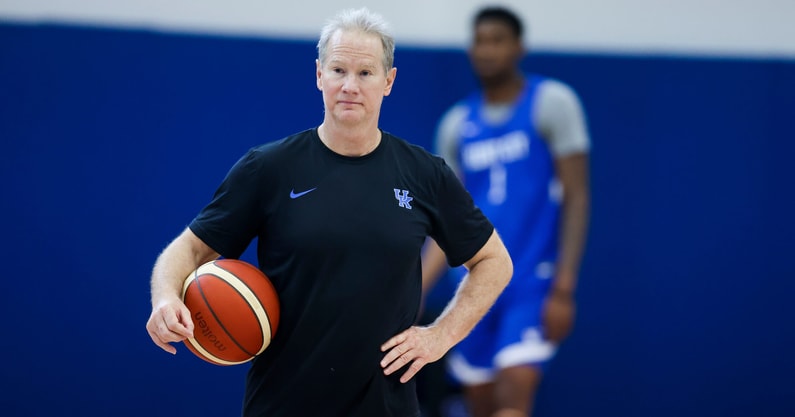
If Tim Grgurich is Yoda, John Welch is Luke Skywalker. Basketball master and apprentice, unanimously respected in the coaching ranks. And to tell the story of the latter and his journey to Kentucky, you have to know the larger-than-life figure that is the former.
Grgurich, known simply as “Grg” or “Gurg” in the vast and boundless basketball world, is a pioneer of the sport. The do-it-all 81-year-old played at the University of Pittsburgh in the early 60s, then immediately took over as an assistant coach for the Panthers, helping invent the amoeba defense — an aggressive gambling strategy later made famous by Jerry Tarkanian at UNLV.
With Grg’s help, of course.
After a five-year head coaching stint at Pitt (1975-80), he joined Tark’s staff with the Runnin’ Rebels and stuck for over a decade. That’s where John Welch entered the fold, playing high school ball in North Las Vegas before spending two years at Nevada-Reno and then transferring to UNLV for his senior year. Like Grgurich, Welch joined his alma mater to begin his coaching career, starting out as a graduate assistant from ’86-89.
“He ran all of the preseason conditioning, put our defense in and it was amazing watching him coach and teach,” Welch said of Grg. “It was eye-opening the impact he made on players and how much he cared about the players, how much effort he put forth. I couldn’t have asked for a better role model and mentor. It’s a very fortunate situation for myself to have him and Coach Tarkanian there.”
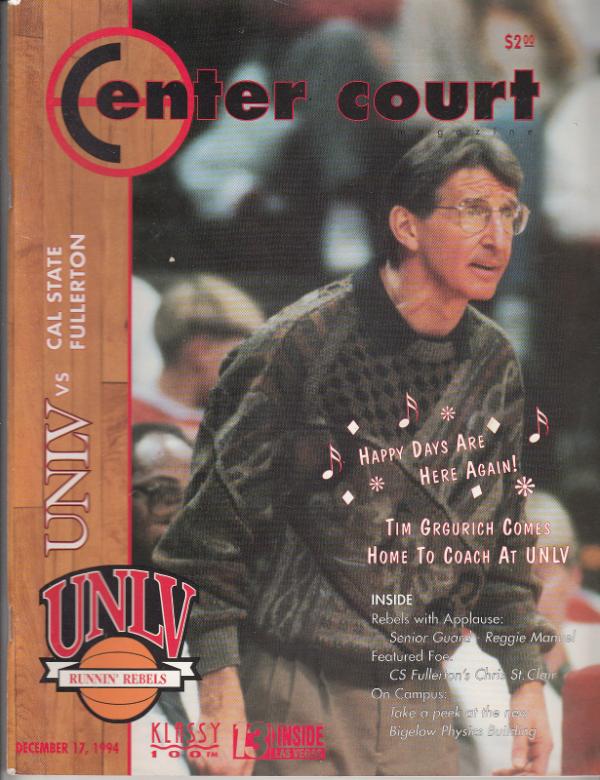
Grgurich went on to coach in the NBA from 1992 all the way through 2021, spending time with the Seattle SuperSonics, Portland Trail Blazers, Phoenix Suns, Denver Nuggets, Dallas Mavericks, Milwaukee Bucks and Detroit Pistons. Welch stuck around in college for a decade-plus before following in Grg’s footsteps to the league, making stops in Memphis, Denver, Brooklyn, Sacramento and Los Angeles with the Clippers before finding his way to Lexington, joining John Calipari’s staff at Kentucky this offseason.
Two separate careers and coaching journeys with a few overlaps, but the foundation was set in Vegas. That’s where Welch watched Grg become ‘Yoda,’ the godfather of modern player development.
Coach or teacher?
Welch remembers watching Grg host defensive camps at UNLV in three-hour windows on Friday nights and Saturday mornings. The top teams from the West Coast would flock to the training sessions, 60 or so high-profile players in the gym per camp, all there to soak up the basketball knowledge Grg left out on the floor with every bead of sweat.
Thing is, there was never a ball in sight. It was about learning the basic principles and fundamentals of the game, mastering the little things that separate the good from the great. Grg was adamant you didn’t need a basketball to teach those things.
As a rising coach in the business, Welch was in awe.
“These are the best high school players on the West Coast. The energy he brought to it? Truly one of the most amazing experiences,” Welch told KSR. “There is no one else in the world who can keep the top high school players in the country diving on a gym floor, sliding and closing out — and loving doing it.
“I was able to watch him and say, ‘Wow, that is what a coach should do.'”
What Welch doesn’t know, though, is that Grg was watching him closely, too. He saw the gifts he had right away and knew his future in the business was bright.
“He was quite the young teacher and coach,” Grgurich said of Welch. “He’s a teacher of the game — individually and team-wise. Studies the game as well as anybody I know.”
Explaining player development
Grg’s role in developing and implementing a high-risk, high-reward defense at Pitt and UNLV is only a fraction of his basketball story and the impact he’s made on the game in five-plus decades as a coach. His transition to the NBA is where his reputation as a player development guru blossomed. Dwane Casey, who coached with Grgurich with the SuperSonics, once referred to him as “one of the best in the world, bar none” at the craft.
But what does player development actually mean? It’s more of a philosophy or approach to the game than a term with a copy-and-pastable definition. A repurposing of traditional basketball verbiage, if you will.
“Most people say player development,” Grg said. “But I’d say it’s more about teaching.”
It’s the developing of new habits and breaking of bad and old. It’s a game plan and attack strategy for steady, tangible improvement. It’s building relationships, maybe a difficult conversation with harsh realities to make something click or inspire change. It’s the after-hours in the gym, pushing to maximize every rep for the greatest return on investment.
Grgurich was that guy behind the scenes at every stop. He couldn’t care less about the media attention or publicity — “I’m only doing this for Welchy,” Grg said upon agreeing to do this interview. It was about his love of the game and helping the coaches and players within it.
“I’ve known him for 40 years. If you ask Rick Carlisle, it’s Grg. Ask Mike Brown, it’s Grg. You ask anyone,” Welch said of Grgurich. “He has helped more players and coaches — especially coaches — than anyone. I truly believe he’s the most respected coach in the game by other coaches.”
Those guys agree.
“When I think of Grg, to me, he’s the pied piper,” Brown tells KSR. “Wherever he is, players and coaches will come. … There are other guys that have coaches around the league that have done very well, but Grg has developed more video guys into assistant coaches and more assistants into head coaches, in my opinion, than anybody else in history. It’s not even close.”
“Based on his impact on our game, he’s the greatest assistant coach in the history of NBA basketball,” Carlisle previously added. “And it’s not close.”

The apple doesn’t fall far from the coaching tree, Welch earning a similar approval rating bouncing around the NBA for two decades. He’s worked under the likes of George Karl, Doc Rivers, Jason Kidd and Hubie Brown, coached the likes of Carmelo Anthony, Allen Iverson, Chauncey Billups, Pau Gasol, Kawhi Leonard, Chris Paul, Blake Griffin, DeMarcus Cousins, Deron Williams, Kevin Garnett, Paul Pierce and Brook Lopez.
Like Grg, Welch became a player development aficionado of sorts. And just like his mentor, he’ll tell you that specific phrasing is overrated.
“Player development — I don’t know, I heard it the first time probably six or seven years ago. For me, it’s just coaching,” Welch said. “That’s what coaching is, you make the players on your team better. That’s the purpose of the coach. To me, it’s just kind of what you do. It’s what I’ve always done. I’ve coached for 35 years or so and to me that’s just how you coach. That’s normal for me.”
The ultimate gym rat
Welch got his first shot as a full-time assistant on Seth Greenberg’s staff at Long Beach State. There, he made quite the impression as someone who refused to be outworked — and probably could have helped chip in for rent.
He lived there, the conductor of a revolving door of players in and out of the gym.
“He’s lost in the game, loves being in the gym working out guys,” Greenberg said of Welch. “It’s one thing to have guys who want to be in the gym, but it’s another to have guys who want to work once they get in the gym. He will work beside them. John does a really good job connecting with guys, getting them to fall in love with the game even deeper. You’ve got to have guys who are in love with the game and want to work, want to get better.”
As Grg puts it, there is a necessary unconditional love that comes with being a coach, something Welch has embraced. You can’t pick favorites, singling out the stars from the benchwarmers. You can’t be there for players when they’re on heaters and forget about them when they’re in a mental funk.
It’s all or nothing. That’s a responsibility you take on when you sign up to be a coach.
“It’s a trust thing, a trust thing with the players where they know you’re there whether you’re screwing up or not. John will be there,” Grg said. “John doesn’t care about being with the top guy, this guy or that guy. Whoever shows up, that’s what he does. He has a lot of trust in any program.
“John isn’t going to come in and push his chest out, he’s not that way. He says, ‘Let’s go.’ He’s going to come in and work at it, try to make everybody better.”
“I just try to do what I can do,” Welch added. “My biggest strength is that I’m available. I try to help the players in any way that I can.”
Finding magic in Denver
Welch reconnected with Tarkanian again at Fresno State from ’95 to ’02 before getting his first call-up to the big leagues, Hall of Fame inductee Hubie Brown hiring him as an assistant with the Memphis Grizzlies — “a pretty big accomplishment,” Grg says.
Then came his breakthrough as a coach in Denver with George Karl and the Nuggets. There, Grg got a front-row seat to Welch’s transition from rising star to established vet.
“That’s where I was most proud of him,” he said. “… John was very, very good with George Karl. Those two guys were perfect.”
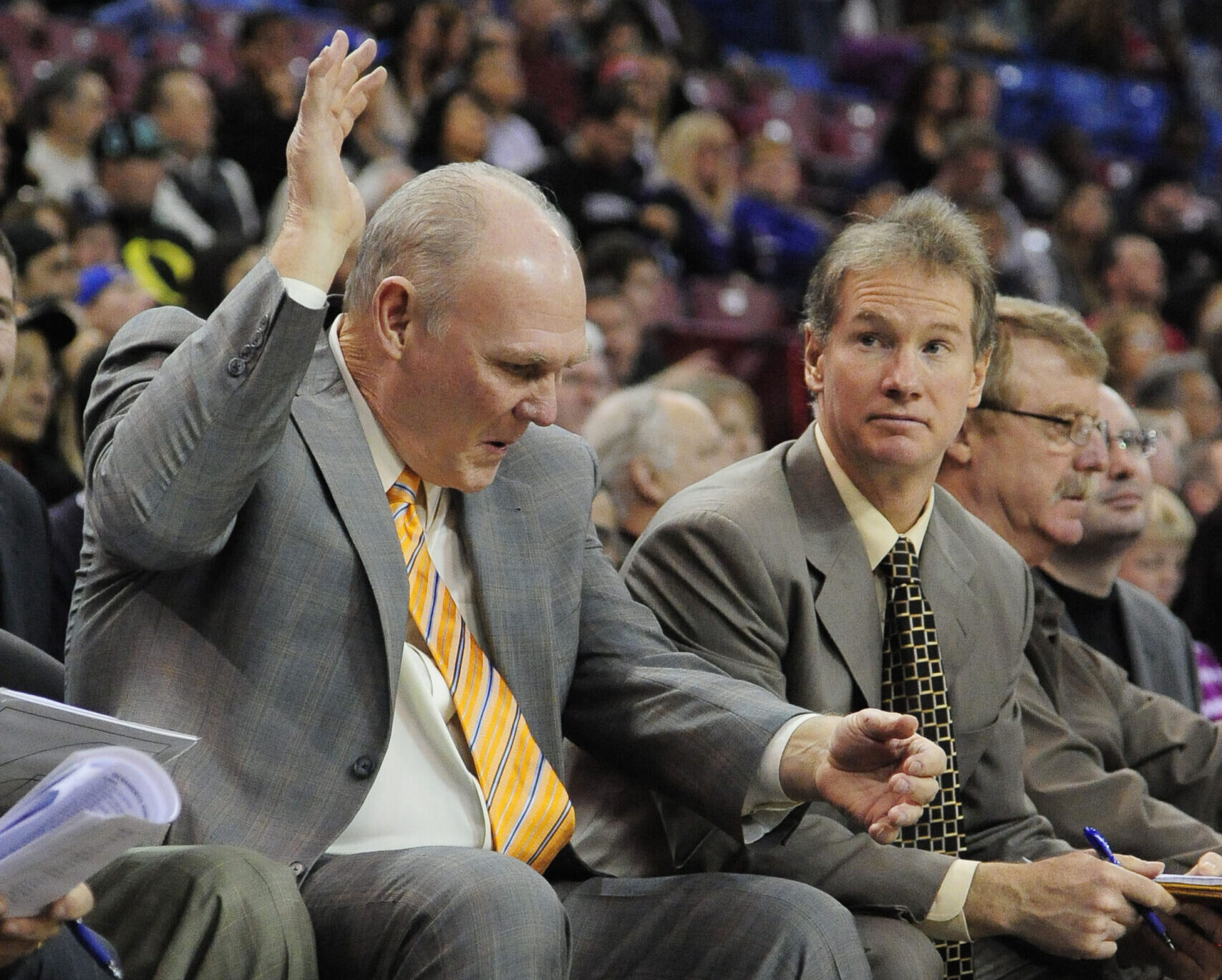
UNLV was a running program, priding itself on scoring early and often by forcing turnovers and getting out in transition. Those were Welch’s roots as a Tark product. Memphis with Brown was similar — a short-lived tenure, but an exciting one that saw the Hall of Famer win Coach of the Year honors after winning a franchise-record 50 games in ’03-04.
Welch found his voice, though, working with Karl and Grg in Denver. The Nuggets looked to zig while the rest of the NBA zagged, running three or four different offenses with an emphasis on innovation.
“John was right in the middle of all of that, pushing forward on all of it — even more so than I,” Grg said. “I was more ‘If this is what you want to do, this is what we’ll do [laughs].'”
“We thought we had a huge advantage because we played fast and played random,” Welch added. “People said back then that it wouldn’t work in the Playoffs, it’d only work in the regular season. Then people started to realize that playing random basketball is an advantage.”
Karl and Welch came in together and left together. In that span, the Nuggets reached eight consecutive playoff appearances, including three No. 1 finishes in the Northwest Division and a run to the Western Conference Finals in 2009.
Point guard success
What was the secret to their success together in Denver? Karl looks back to Grg’s time with him in Seattle with the SuperSonics from ’92-98 as the foundation.
“In the early days, Grg was great with Gary Payton. Grg was great with Sam Cassell. There are a lot of guys Grg was great with,” Karl says.
He’s coached some all-timers, namely Carmelo Anthony, Scottie Pippen, Shawn Kemp and Allen Iverson. A magnet for elite talent — all swearing by his workouts and endless supply of basketball knowledge.
“It’s just very humbling coaching with him,” Welch said. “You talk about players gravitating to someone, there’s just something about him. When you coach with him, it’s like, ‘Ah, that’s how it’s supposed to be done.'”
During that time, Grg was mentoring Welch, just as he did under Tarkanian at UNLV. Karl gave Grg his first NBA job, then hired him again in Denver with Welch, hoping to recreate the magic they found together in Vegas.
“When I brought him to the NBA, it made me a great coach and he was a big part of my success,” Karl said. “Grg and I argued almost every single day, but it was only because we wanted to compete. We wanted to get better, make players understand the game. With John Welch, he learned from Grg, he learned from being in that system.”
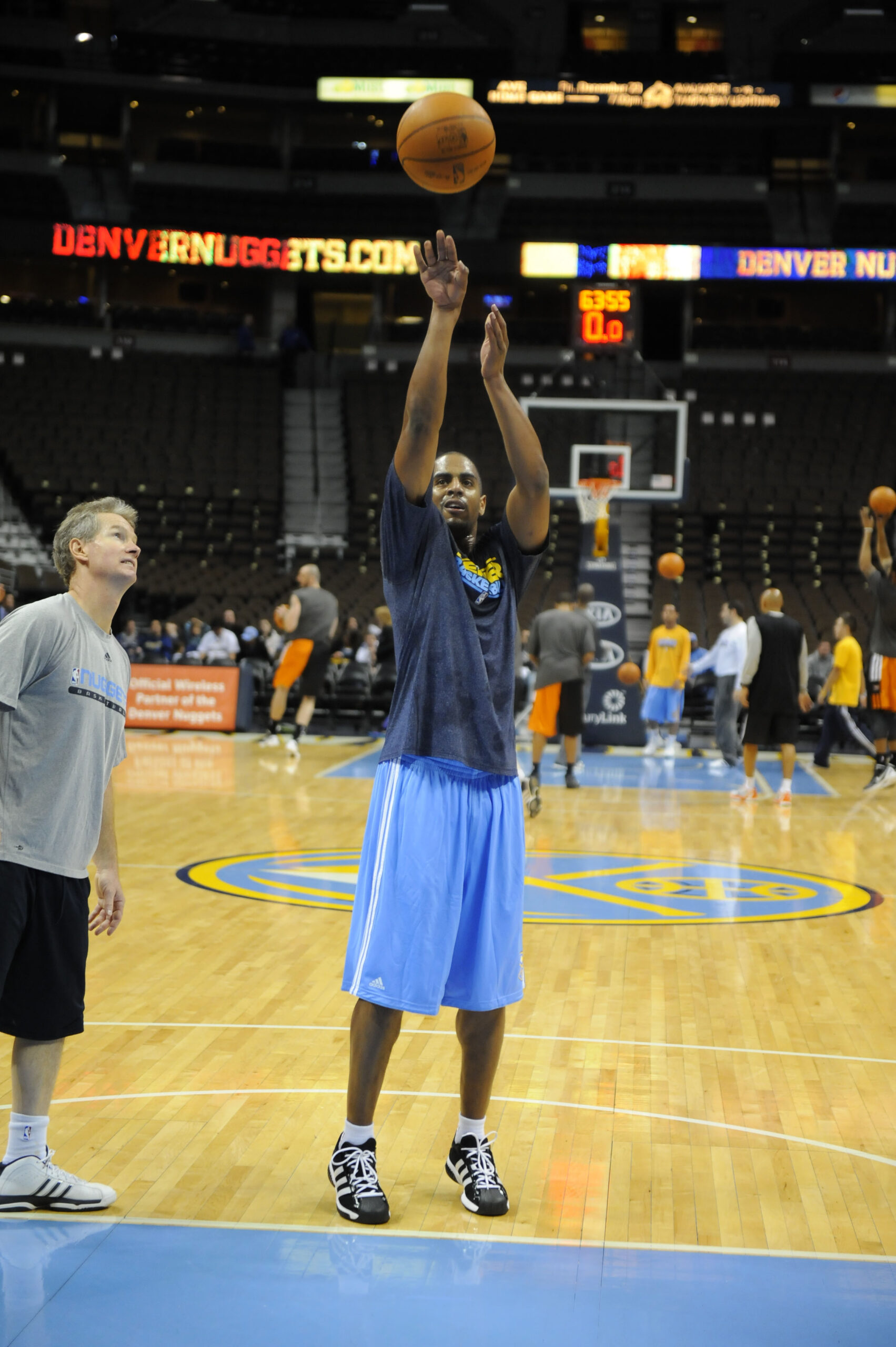
Welch himself was an all-state guard who played college and pro ball. He had a guard-oriented mind, a knack for connecting with backcourt talents — lead guards like himself. The former Runnin’ Rebel just got through to them.
And fortunately for Karl, he had a run of darn good ones in Denver. There’s a bit of a chicken-or-egg dynamic at play there, but it’s no coincidence that Welch’s hands-on training coincided with that success with the Nuggets.
Karl certainly won’t take credit for it.
“John is a point guard guru, making guys understand how to play the game. The quarterback of the game of basketball is the point guard. John is really, really good with point guards. He’s really good with the IQ of leading a team,” Karl said. “My success in the NBA is all because I had a lot of good point guards, a lot of really good point guards. He made Ty Lawson a hell of a player. He helped Andre Miller become a way better player. And he took Chauncey Billups and made him a better player. Whatever it took.
“Chauncey Billups came to us after ten years of being successful and we put him in a system of playing fast, something he was never in. And then he fell in love with it. That was a lot because of Johnny Welch.”
“If Mike D’Antoni is the point guard whisperer, Grg is the player whisperer,” NBA superagent Warren LeGarie added. “And John Welch is the closest anyone has ever come to that.”
Demonstration leads to respect
Karl was a Dean Smith guy at North Carolina, playing three years of varsity ball in Chapel Hill before his time in the pros as a player and coach. Smith harped on two things at practice: get better and get smarter every day. No wasted reps, no wasted days. Find a way to improve physically and mentally.
It was the Hall of Fame coach’s version of ‘player development’ before it became a fad with fancy drills and scientific data in today’s game.
The model was the same. In order to get better faster, you built individual plans focused on repetition, going above and beyond what was asked of you in practice. There were pre-practice and post-practice workouts. Some days you worked on shooting, others it was decision-making or defense. Some days you worked on intelligence or basketball IQ.
And there was never a one-size-fits-all method for each player. What worked for Andre Miller didn’t necessarily work for Chauncey Billups or Allen Iverson or Ty Lawson and so on.
“That’s what John and Grg do. They make guys better. Every guy, there is not one package for everybody. You’ve just got to get in the gym, see how they play, then work with them. You motivate them to want to be there. And then you do it every day,” Karl said. “… Every player has weaknesses, and the weaknesses are different. If you’re going to develop them, you’ve got to motivate them to do it themselves, to want to be in the gym, to want to get better. Once they have that attitude, it’s easier to coach them.”
Availability is important, as is work ethic, being a grinder. Structure, too. The true difference-maker, though? Respect.
The reality is Welch doesn’t just coach. Grg didn’t, either. They demonstrate, participating in hand-to-hand combat. Engaged in drills, they guarded and fought, leading by example to physically — not verbally — develop. When someone needed help, they started a game of one-on-one or jumped in for three-on-three and five-on-five. If a player needed to get in shape, “they worked their asses off with them,” Karl says.
To put it simply, if you participated in a workout with Grg or Welch — God forbid both — you felt it. And they participated themselves to prove their investment in your development. That was the trade-off.
“Today’s workouts, if you watch them, they’re not grown-man workouts. They are fun. There is no physicality. It’s not that hard,” Karl said. “Well, Grg and John Welch, you work your ass off. There is physicality, there is one-on-one, two-on-two, there are bodies hitting each other. I think today’s workout, everybody talks about it more than ever before, but there is only a small group of guys that know what the hell they’re doing. And most of them have been mentored by Grg or John Welch — the ones that know what they’re doing.”
If it’s hard, it’s working. That mental hurdle telling you it’s time to give up or rest? That’s the jump between winning and losing. ‘Player development’ was never supposed to be easy.
Those are the basketball lessons Welch — like Grg — has learned to master over the years, something Karl doesn’t believe he gets enough credit for: the mental side of the game. How tough it is to play well and be a winning player, how to persevere through tough times, how difficult it is to “forget about your selfish self and be a committed teammate.” All of the things that make a pro and understanding how hard that is.
“John Welch and Grg are the best at it.”
Making the pieces fit
Welch earned Grg’s respect as a player and graduate assistant at UNLV, then as a full-time assistant in Denver by being there. He was reliable, never had to question if he’d show up for work. Odds are he beat you there anyway.
“He’s a tireless guy, he’s in the gym forever. Many guys are and John is one of them,” Grg said. “His son, Riley (Welch), is heading in the same direction. The thing that is good about John is he has worked with so many wonderful head coaches and they have depended on him.”
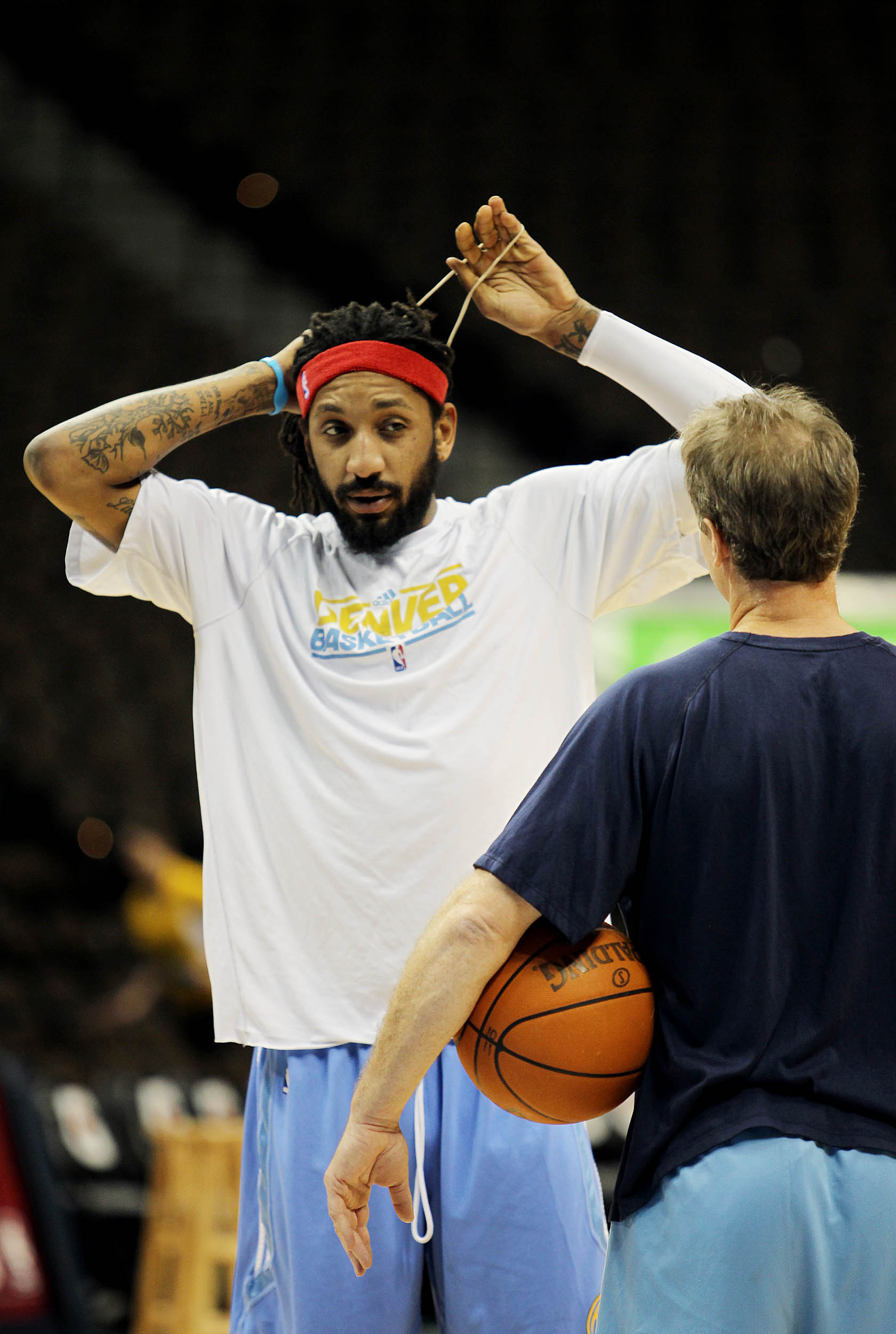
If you ask Karl, no one has been more dependable than John Welch in almost three decades as a head coach in the NBA. First in Denver, then again with the Sacramento Kings in ’15-16, he was the glue that held it all together.
“Welch is, in a lot of ways, what I call a glue guy. In basketball, there are guys that make everybody work. They make the puzzle pieces fit, they connect them. John would do anything I wanted him to do,” Karl said. “If I needed him to sweep the floors, he’d do it. If I asked him to work out with the hardest guy in the world to work out, he’d do it. He never bitched, he never complained. He just wanted to be in the gym and he wanted to help the team. He’s the best teammate I’ve ever been around on a coaching staff. He doesn’t rock the boat, he doesn’t complain. All he does is come to work every day, probably works harder than anyone, every day.
“He’ll do whatever is necessary to make a team better. He’s selfless, he’s committed and he’s got a damn good basketball mind. He does not have a weakness. If anything, his weakness is that he wants to win all of the time. Winning is what drives us, getting better is what drives us, building a team around good people that makes them grow and have success, that’s what drives us. Welch is really, really good at getting guys better.”
Any other questions?
George Karl has one.
How is Welch not a head coach?
Karl won 1,175 games in the NBA and led five different teams to the postseason on 22 separate occasions, inducted into the Basketball Hall of Fame in ’22. He knows what winning looks like and how to do it at the highest level.
Welch fits that mold, but his shot has never come. The closest he’s gotten was being named head coach of Ostioneros de Guaymas, a Mexican professional basketball team. That job lasted from 2022-23.
Top 10
- 1Hot
Cats demolish Purdue
When do we play the hard teams?
- 2Hot
'96 comparison
Pope is thinking '96 after Purdue win
- 3
Highlights
Let's go ahead and relive that
- 4Hot
Enjoy it, BBN!
Yes, you can celebrate the big W
- 5
Lessons Learned
from the W over Purdue.
Get the Daily On3 Newsletter in your inbox every morning
By clicking "Subscribe to Newsletter", I agree to On3's Privacy Notice, Terms, and use of my personal information described therein.
He’s got the track record and basketball mind, but not the NBA call-up. And, to be frank, Karl thinks that’s a load of horse hockey, especially when you get into the ‘why.‘
“The crazy thing about John Welch is that he is not going to get hired in the NBA. I heard this from two guys who did not hire Johnny Welch. I said, ‘Why the hell did you not hire John?’ You know what they said? ‘He works the guys too hard,'” Karl said. “I cannot believe a guy doesn’t get a job because he works out players too hard. I just don’t believe that. John Welch was turned down by an NBA team because the general manager thought the load management would be too hard on his players.
“That’s how crazy the NBA has gotten. Players today, they don’t want it the right way. They want it their way. … I truly think he could be a hell of a head coach. No one wants to give him a job because he’s never done it, he’s never been a head coach. But John Welch knows the game and I think he’d be a damn good head coach.”
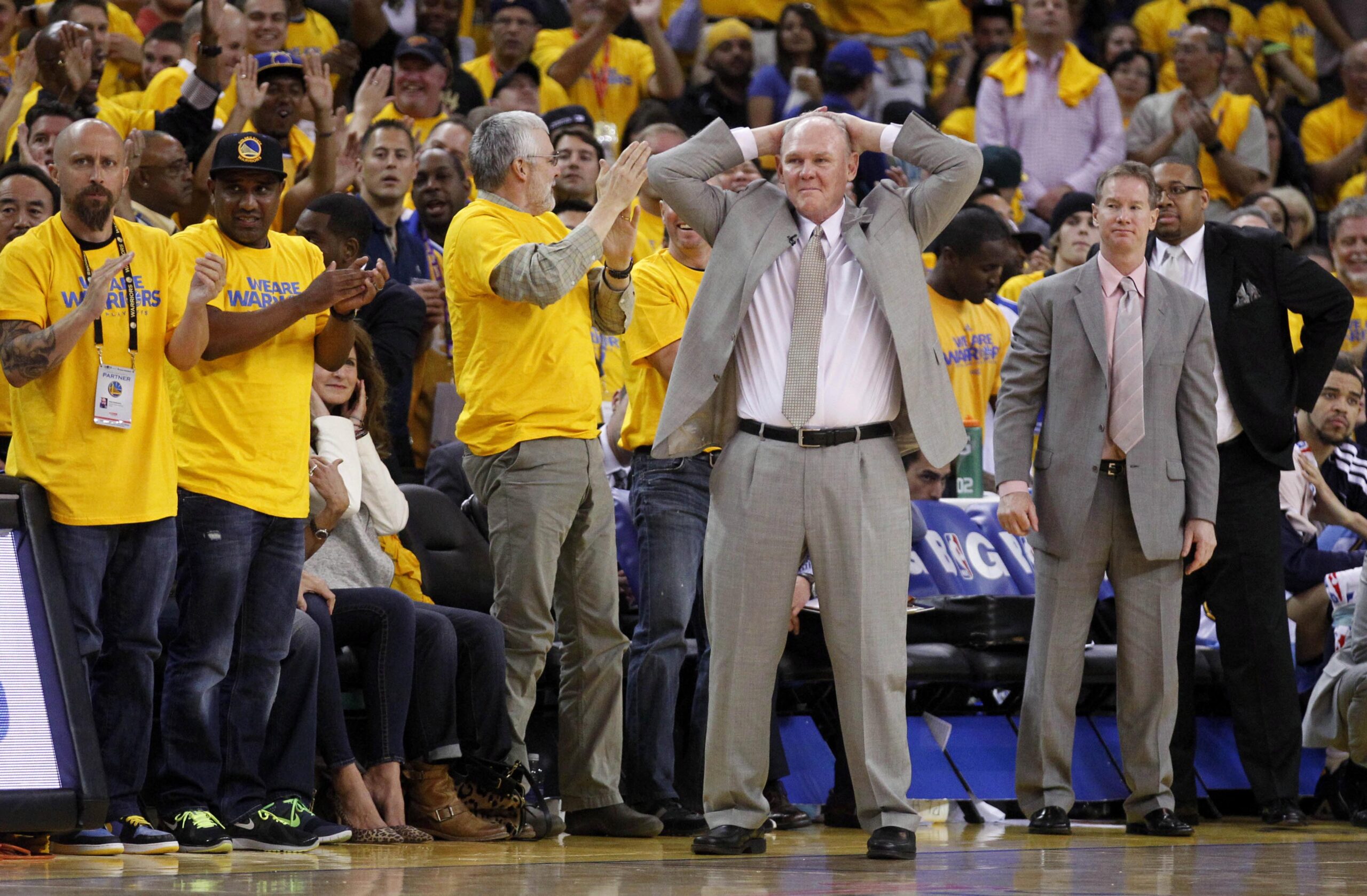
Like Grg, Welch has earned a reputation for putting his head down and going to work behind the scenes. The 60-year-old will still lace ’em up with you and dig his heels in as a pesky defensive dummy in a workout, but he couldn’t care less about playing the media game as a public personality at any of his coaching stops. Not then, not now, not ever.
NBA general managers don’t value that mindset — not with head coaches, anyway.
“There are only 30 jobs in the NBA. I’m not sure athletic directors and general managers know how to hire a coach. They hire the coach that wins a press conference. The truth of the matter is a good coach doesn’t give a damn about the press conference,” Karl said. “A good coach only cares about the gym. Grg and John Welch only care about the gym, that’s the most important thing in being a coach. You’re a teacher, you’re a mentor, you’re a big brother. It comes in a lot of different packages.
“The hype around the game, the publicity and social networking, it’s crazy. It doesn’t win any games, that’s a negative energy. The positive energy is going in the gym and getting better, getting smarter and learning how to win. … I was blessed by Grg and I was blessed by John. They are two of the best guys in basketball. It’s kind of sad neither one of them is in the NBA.”
At 81 years old, Grgurich isn’t looking to be the face and voice of a franchise anytime soon. He still helps out and mentors however he can across all levels of basketball, teaching at camps and taking calls from teams looking to pick his brain. He’ll always be around in some form, continuing to give back to the game he has taken essentially nothing from in six decades.
But Welch has plenty of tread left on his coaching tires. Grg believes it could (and probably should) be in the league, but an NBA farm system like Kentucky works too.
“It’s a good change for him. The NBA is funny in a lot of ways. As good a job as he has done, as good as anyone in the league, for him to not be working for a year and a half? That’s on everybody (else),” Grg said. “If he wanted to be a head coach, I thought he could have been. He always wanted to go back to college, but if he were to really push for it, he probably could. To have him on your staff, I think you’re pretty fortunate.”
How Kentucky benefits
It’s not fair to say one man’s misfortune is another man’s opportunity in this case — Welch always wanted to give college coaching another shot, and it’s hard to ask for a better one than under yet another Hall of Famer in John Calipari at the all-time winningest program in Kentucky.
He helped Coach Cal install the dribble-drive with Vance Walberg at Memphis and watched his son, Riley, play and coach at Kentucky as a walk-on (2019-21) and graduate assistant (2021-23), respectively. Welch could see how much time and effort Calipari put into his teams and saw a clear fit.
It was something he wanted to be a part of, following in Riley’s footsteps to Lexington. Like son, like father.
“I’ve been amazed at Coach Cal’s work ethic. I find it incredible and inspiring. That’s why I want to help in any way I can to make his work and effort and the players’ effort carry over to games,” Welch said. “It was just amazing to me the amount of time Coach Cal puts into this team. That’s what he does, it’s 24/7.”
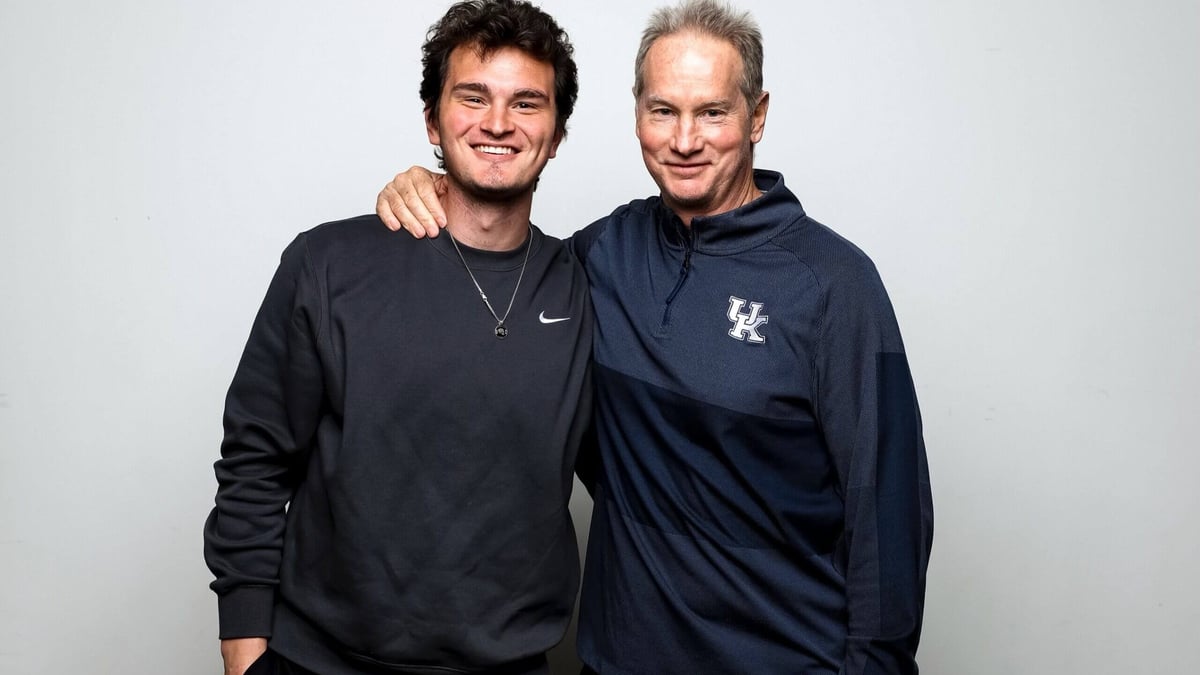
A fellow Yinzer himself, Grgurich grew up in the same Pittsburgh basketball circles as John Calipari. He’s known him since he was a standout at Moon Area High School and followed his playing career at UNC Wilmington and Clarion before his coaching career took off.
“Wherever John (Calipari) goes, I’m excited. I root for him. I think he’s wild sometimes, I call him all the time and I love laughing with him,” Grg said. “He’s a loyal guy, very loyal to our community in Pittsburgh and the coaches there. And he’s loyal to the game. I always hope he wins every game — unless I was playing him [laughs].”
He’s close with Bruiser Flint, followed Orlando Antigua’s playing and coaching career as a former Pitt Panther — “I think the world of those guys, they’re all coaches and they’re good people.” When whispers grew louder his own basketball protege and lifelong friend would be joining that staff at Kentucky, he started dreaming big about the possibilities just like the rest of us.
“He’s been a big fan of John (Calipari),” Grg said. “I think (Welch) will be able to help with the offense in many ways because he’s been around so many good offensive coaches. John isn’t a guy who says you’ve got to do it this way or that way. He says, ‘This is how you want to do it? I’ll teach you that way.’ He’s just a great teacher. He’s just a guy who fits in with the staff, fits in with the head coach.”
Pushing the wheel forward, not reinventing it
It’s not Welch’s intention to blur Calipari’s vision with his team, he’s not a disruptor. He’s simply a conveyor and demonstrator of ideas, the middle man between players and head coach making both sides’ lives easier.
It doesn’t hurt that his coaching views align with Cal’s rather seamlessly.
“I’m not so much presenting new ideas. All I’m trying to do is get Coach Cal’s ideas across to the players, making sure we’re doing them well,” Welch said. “That’s more of my responsibility, figuring out what Coach Cal wants done and getting that done, helping the players understand it and making sure they’re working on the things he wants them to work on that can apply to practice and the game.”
Circle back to what Welch said about why those Nuggets teams worked during his time in Denver: “We thought we had a huge advantage because we played fast and played random.” Fast forward to, well, basically the start of the offseason and every time John Calipari has had a microphone in his face since. Random basketball has been the motto, this group’s identity well before the Wildcats ever played a regulation game.
The messaging is identical.
“Random basketball is an advantage,” Welch said of working with Karl and Grg in Denver. “… The most important thing on offense is scoring easily in transition or getting the ball to the paint and playing inside-out basketball. Not so much learning plays and patterns, it’s more about getting your good players the ball in space and letting them create and make plays for themselves and for others.
“That’s what Coach Cal does as well as anybody.”
They’re on the same page, and it’s why Grg believes they’ll build similar coaching chemistry and team success together to that of Welch and Karl. They’ll bring the best out of each other.
“I could see Coach Cal being the same with John, can see them having the same success. Sometimes a program needs a change, whether it be Kentucky or Denver back then. Change is good and I think it’ll be good for both of them,” Grg said. “Offensively, that’s where (Kentucky) struggled a little bit, but John is really good at fixing that because of all of the people he’s worked with. Him and George (Karl), I envision that happening at Kentucky.
“That will be a program everyone will be excited about this year.”
A modern basketball takeover in Lexington
The sport’s future revolves around spacing and shooting with positionless roles. Gone are the days of plodding, unskilled bigs and pure athletes hurling bricks from the perimeter. You’ve got to be able to put the ball on the floor and hit shots if you plan to even sniff the pros.
“The game is evolving and the biggest thing is evolving skill,” Welch said. “The skill levels of players and the amount of time they put into the game.”
He adds that today’s player spends more time in the gym than players in years past “by a big margin,” both with coaches and individual trainers. Skill, shooting accuracy and range, deception, basketball IQ and decision-making, it’s all exponentially better now because “those things are valued at the next level.” Kids want to make it.
Fortunately for Welch, Kentucky’s got a roster full of those guys to work with this season. Right up Johnny Gym Rat’s alley.
“We have very talented players and they are very driven to be good. I think they are self-motivated, they’ve been successful in their playing careers,” Welch said. “And they want to continue to be successful. They want to win basketball games for the University of Kentucky.”
And maybe above all else, the pieces fit. No more shoving square pegs in round holes simply hoping for the best every time down the floor. You’ve got a true system set and the dudes to run it.
From there, the coaches can add wrinkles and branches as they see fit while sticking to the script of random.
“This team fits the dribble-drive very well. I think we have very skilled players, plenty of playmakers,” Welch said. “We have a surprisingly very good shooting team — they’ve shot the ball really well. People have applied the dribble-drive at NBA and European levels, they’ve implemented it into the pick-and-roll offense. From the pick-and-roll, you go dribble-drive. Whatever play you run, you end up in dribble-drive.
“It’s just moving up penetrations and attacking the paint and moving. It can be implemented and applied in just about any situation. Coach Cal over the years has done a great job with it. The skill set of our players fit it very well.”
An anticipated bounce-back season
Calipari has vehemently chosen talent over experience from day one, a mindset he’s recently doubled back down on after testing uncharted waters when the portal floodgates opened in recent years. Rather than sprinkling in the occasional complementary grad transfer, he dove head-first into what has become offseason free agency for the foundation of his rosters. The results? Two combined wins in the SEC and NCAA Tournaments over the last two seasons — one apiece.
This time around, he turned back to what he knew. As the college basketball world got older, he went historically young.
“He needs his own guys. Portal guys, they’re more like mercenaries. You’ve got to have them, but you want to bring in your own guys and mold them,” Grg said. “You know what you want in a player. Great programs, they know what they want. If they’re good enough, they go get what they want.
“Coach Cal has a lot of balls. He’s not afraid of getting and bringing in his guys. That’s who he likes.”
Fans have grown restless, begging for another run to the Final Four. They haven’t felt that magic in Lexington since 2015, coming up just short with Elite Eight finishes in 2016-17 and 2018-19, then a what-if cancellation in 2019-20.
The ensuing criticism directed toward Calipari isn’t a surprise, nor is it uncommon in this profession. Ask the guy who has been in it since Lyndon B. Johnson was in the Oval Office.
“No matter who you are, you’re going to get criticism in this day and age. We have guys who win championships and a year later they’re let go in the NBA, which is — whatever, I could use bad words right now [laughs],” Grg said. “It’s the same way at Kentucky.”
Back to getting his guys while calling in a few crucial staff reinforcements, there is hope the stars align once again for a return to the pinnacle of college basketball. Pressure creates diamonds, Calipari hoping they’re in the form of championship rings in Phoenix this coming April.
“John is a warrior, he’s a survivor. He’s going to move forward,” Grg adds. “I know how good of a coach he is. He’s always going to be successful, he’s always going to get good players. If you can win it every year, you’re a magician. You can’t win it every year, as good as you may be.
“He’s in the right place, he’ll get you back where you want to be. It’s going to be a great bounce-back year for everybody there.”
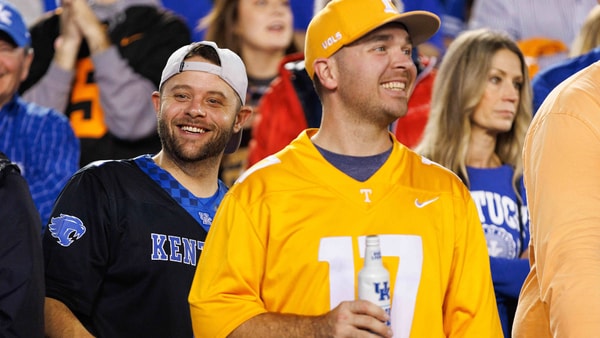
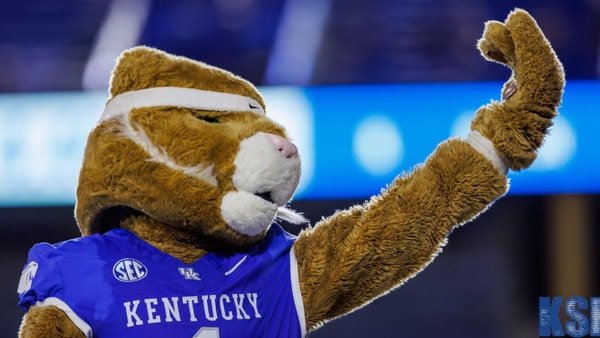
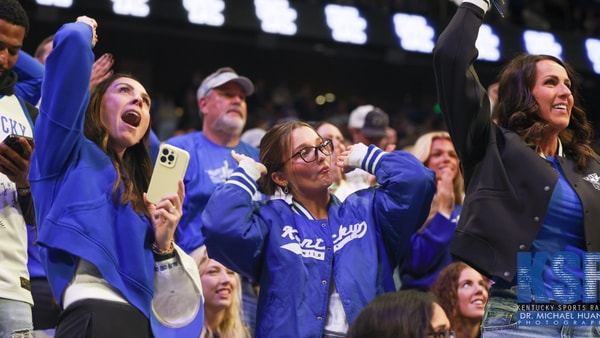
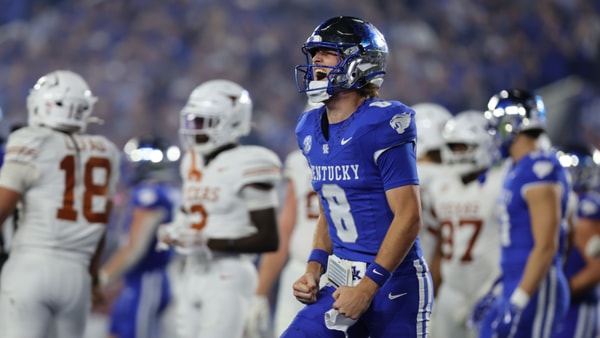
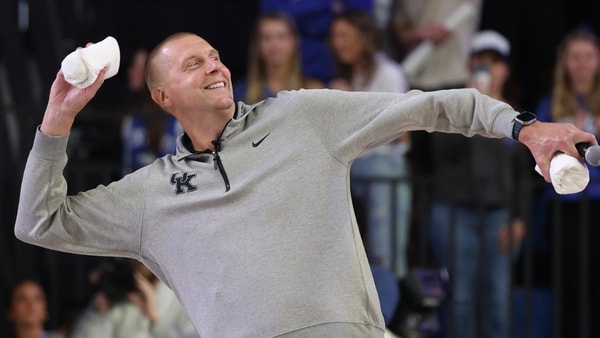
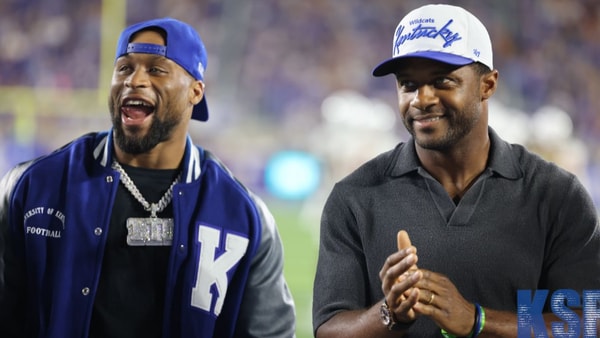
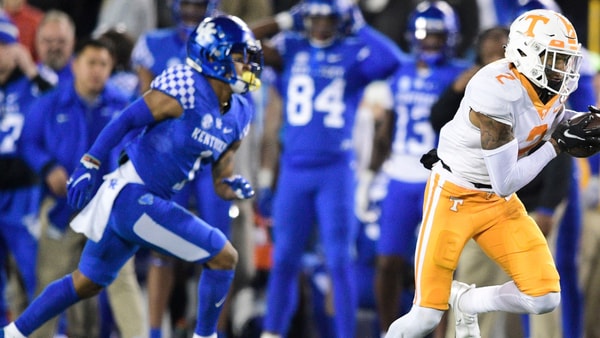
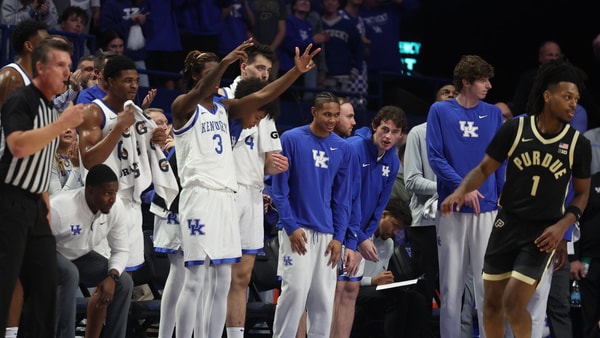
Discuss This Article
Comments have moved.
Join the conversation and talk about this article and all things Kentucky Sports in the new KSR Message Board.
KSBoard